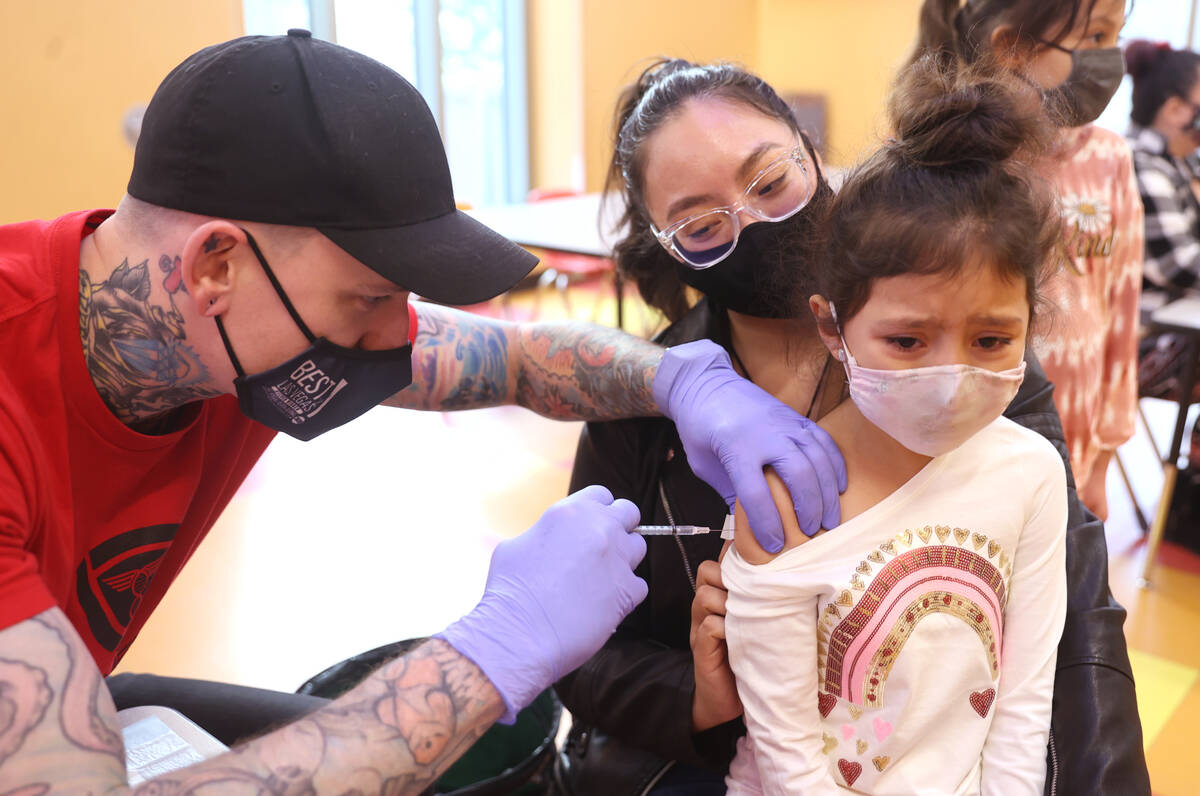Clark County’s COVID-19 test positivity rate surpasses summer surge
Clark County’s COVID-19 test positivity rate has blown past the peak of the summer surge of the disease, according to state and local data posted Tuesday.
The county’s 14-day test positivity rate, which tracks the percentage of those tested who are found to be infected, stood at 17.7 percent on Tuesday, an increase of 3.6 percentage points from Monday and higher than the 15.9 percent that marked the peak of the summer wave on Aug. 8.
The jump, an increase of more than 25 percent in a single day, added to evidence that the county is experiencing unprecedented growth of COVID-19 as the omicron variant spreads through the community.
The Southern Nevada Health District also reported 1,936 new COVID-19 cases and 38 additional deaths during the preceding day, pushing the total for the county to 379,454 cases and 6,499 fatalities.
The daily death toll appeared to be inflated by the inclusion of fatalities from the preceding four days, as the health district has not been reporting any deaths over the weekend since late November.
New cases were above the two-week moving average, which increased by 22 to 1,695 per day. Deaths also were well above the two-week average, which rose from two to three.
Data guide: COVID-19’s impact on Nevada
Deaths have not been rising at the same rate as the county’s other COVID-19 metrics, lending credence to early evidence suggesting that while omicron is more contagious than previous variants, it typically does not result in as high a rate of serious complications.
Hospitalization numbers, however, have been climbing in recent days, prompting officials to warn that hospital capacities may be stretched around the state if the trend continues. The number of people with confirmed or suspected cases of COVID-19 in the county held steady at 890 on Tuesday, after a significant jump over the weekend.
Updated guidance on masks
With metrics quickly heading in the wrong direction, the county is a long way from exiting Gov. Steve Sisolak’s mask mandate.
While the county tracks most of its COVID-19 metrics using a 14-day moving average, the federal Centers for Disease Control and Prevention’s transmission risk classification system, on which the state mask mandate is based, uses a seven-day average.
As of Tuesday afternoon, the CDC showed an average of 400.84 new cases per 100,000 residents over the previous seven days, a sharp increase from 273.26 at this time last week. Both figures are in the “high” risk of transmission category under the CDC system.
The second key COVID-19 metric used to determine when a county can exit the mask mandate is the test positivity rate.
Using the CDC’s seven-day average, the rate stood at 34.29 percent on Tuesday, also in the “high” risk category for that metric. That rate was nearly twice the 17.89 percent reported a week ago.
For a county to exit the state mask mandate for crowded indoor public spaces, it must record back-to-back weeks with a seven-day average case rate under 50 per 100,000 residents and a seven-day test positivity rate below 8 percent — metrics considered as posing a “moderate” or “low” risk of transmission by the CDC.
State officials updated weekly guidance on the mask mandate Tuesday, moving Esmeralda County back under the edict after it remained in the“high” transmission category for a second straight week. Residents will be required to mask up again starting Friday.
Eureka, Storey and White Pine counties all were in the “low” or “moderate” transmission categories last week and will continue without mask mandates. Mineral County was in the “moderate” transmission category last week and will exit the mask mandate if it can maintain that for another week.
In a strange twist that illustrates the fluidity of the current surge, White Pine County moved back into the “high” transmission category just hours after state officials listed it in the “moderate” risk category in their mask guidance. County residents will only be required to mask up again if the county spends another week in the “high” or “substantial” categories.
All other counties in the state are in one of those buckets and will still be under mask mandates for at least two more weeks.
The state also reported seven additional breakthrough cases of COVID-19 during the previous week, according to a report dated on Monday. That brought the updated breakthrough case total to 1,369.
State reporting shows breakthrough cases — those in which fully vaccinated individuals are nonetheless infected — have held relatively steady even as the other COVID-19 metrics have been on the rise. Following guidance from the CDC, the state only records breakthrough cases that result in hospitalization or death, meaning the majority of cases go unreported.
Zero breakthrough deaths were reported during the period, so the total held at 312.
State numbers continue parallel rise
The state, meanwhile, reported 2,529 new coronavirus cases and 40 deaths over the preceding day, bringing totals posted by the state Department of Health and Human Services to 499,613 cases and 8,468 deaths.
New cases were well above the two-week moving average, which increased by 16 to 1,896. The two-week moving average of daily fatalities increased from three to four.
Test positivity rate also saw a sharp increase at the state level, rising 3.2 percentage points to 15.8 percent. The number of people hospitalized with confirmed or suspected COVID-19 cases rose by 59 to 1,065.
County numbers are included in the statewide totals.
As of Tuesday’s report, state data showed that 54.60 of Nevadans 5 and older were fully vaccinated, compared with 53.92 percent in Clark County.
Contact Jonah Dylan at jdylan@reviewjournal.com. Follow @TheJonahDylan on Twitter.
Nevada vaccinations
— 5+ population: 3 million.
— Doses administered: 3.99 million.
— Vaccinations initiated: 1.95 million.
— Vaccinations completed: 1.64 million.
— Eligible fully vaccinated: 54.60 percent.
Sources: Department of Health and Human Services; U.S. Census Bureau

















